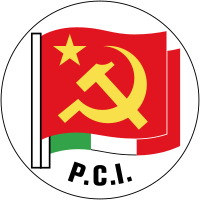No edit summary Tag: Visual edit |
420dengist (talk | contribs) m (changed acronym) Tag: Visual edit |
||
| Line 1: | Line 1: | ||
{{Infobox political party|name=Italian Communist Party|native_name=Partito Comunista Italiano|logo=Italian Communist Party logo.png|founded=21 January 1921|abbreviation= | {{Infobox political party|name=Italian Communist Party|native_name=Partito Comunista Italiano|logo=Italian Communist Party logo.png|founded=21 January 1921|abbreviation=PCd'I (Italian)|dissolution=3 February 1991|newspaper=''l'Unità''|youth_wing=Communist Youth Federation|political_orientation=[[Marxism-Leninism]]<br>[[Revolutionary socialism]]<br>'''Later:'''<br>[[Eurocommunism]]<br>[[Revisionism]]<br>[[Reformism]]}}The '''Italian Communist Party''' ('''PCd'I''') was a [[Marxist-Leninist]], later [[Eurocommunism|Eurocommunist]], party in [[Italy]]. First being created from a spilt with the [[Italian Socialist Party]] in 1921, the Italian Communist Party would last until 1991, when the [[Fall of the Warsaw pact (1989-1992)|fall of the Warsaw pact]] would result in the leadership taking a [[Social democracy|social-democratic]] line. | ||
== History == | == History == | ||
During the [[Prague Spring]], the | During the [[Prague Spring]], the PCd'I defended [[Alexander Dubček]]'s revisionist policies and described [[North Atlantic Treaty Organization|NATO]] as a defensive alliance. It later supported [[Mikhail Gorbachev|Gorbachyov]]'s rejection of [[class struggle]].<ref name=":02222">{{Citation|author=Roger Keeran, Thomas Kenny|year=2010|title=Socialism Betrayed: Behind the Collapse of the Soviet Union|chapter=Turning Point, 1987-88|page=154|pdf=https://ipfs.io/ipfs/bafykbzaceaj5ucph44bjwyhlhsbycckr3ts76zbucn2hbrea32tltcd4s5ekg?filename=Roger%20Keeran_%20Thomas%20Kenny%20-%20Socialism%20Betrayed_%20Behind%20the%20Collapse%20of%20the%20Soviet%20Union-iUniverse.com%20%282010%29.pdf|publisher=iUniverse.com|isbn=9781450241717}}</ref> | ||
== References == | == References == | ||
Revision as of 03:52, 13 June 2023
Italian Communist Party Partito Comunista Italiano | |
|---|---|
 | |
| Abbreviation | PCd'I (Italian) |
| Founded | 21 January 1921 |
| Dissolved | 3 February 1991 |
| Newspaper | l'Unità |
| Youth wing | Communist Youth Federation |
| Political orientation | Marxism-Leninism Revolutionary socialism Later: Eurocommunism Revisionism Reformism |
The Italian Communist Party (PCd'I) was a Marxist-Leninist, later Eurocommunist, party in Italy. First being created from a spilt with the Italian Socialist Party in 1921, the Italian Communist Party would last until 1991, when the fall of the Warsaw pact would result in the leadership taking a social-democratic line.
History
During the Prague Spring, the PCd'I defended Alexander Dubček's revisionist policies and described NATO as a defensive alliance. It later supported Gorbachyov's rejection of class struggle.[1]
References
| Part of a series on |
| Communist parties |
|---|
- ↑ Roger Keeran, Thomas Kenny (2010). Socialism Betrayed: Behind the Collapse of the Soviet Union: 'Turning Point, 1987-88' (p. 154). [PDF] iUniverse.com. ISBN 9781450241717